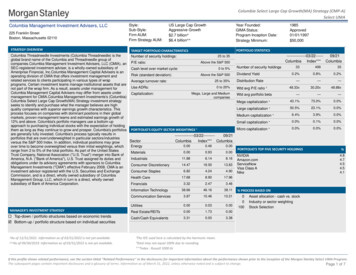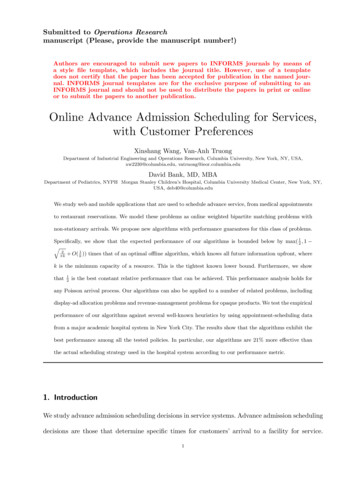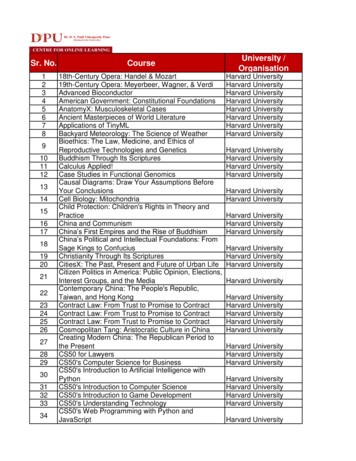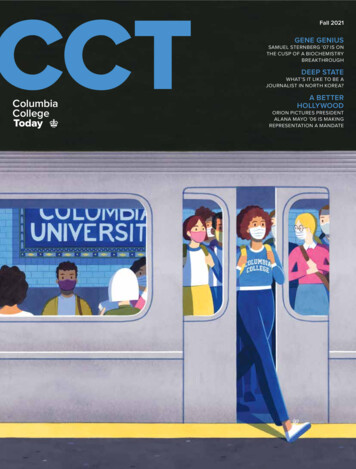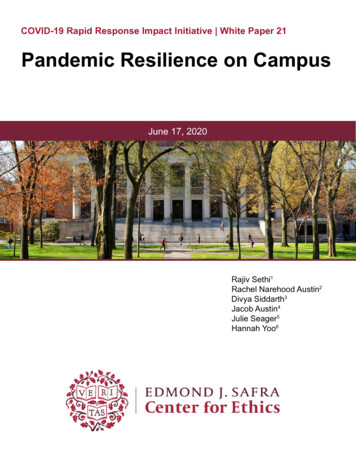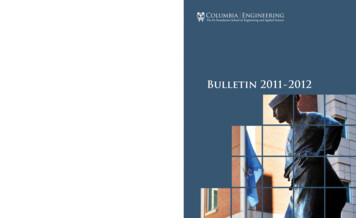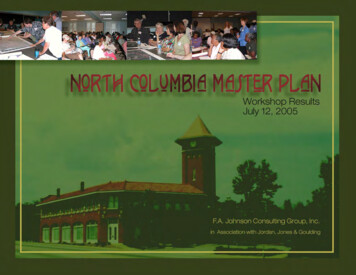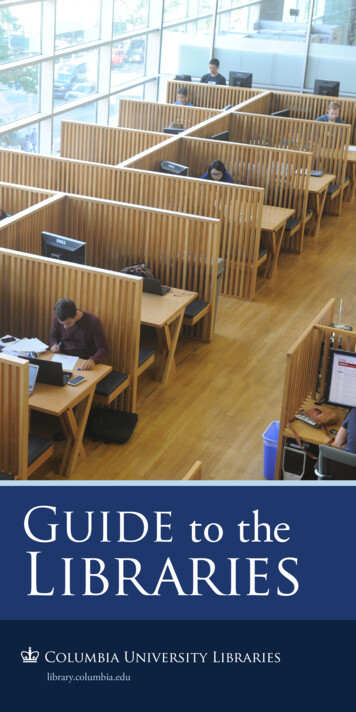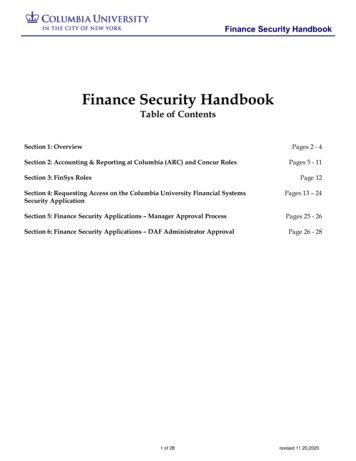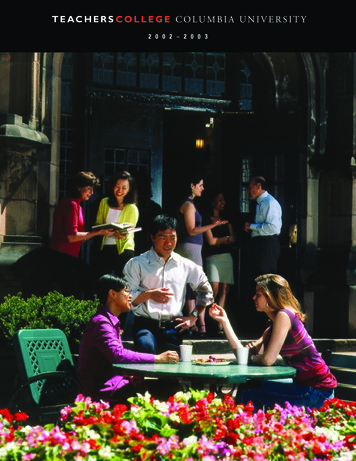
Transcription
T E AC H E R S C O L L E G E C O LU M B I A U N I V E R S I T Y2 0 0 2 – 2 0 0 3
Contents1Teachers CollegeDefining the Work of Educators4An Introduction to Teachers College37Academic and Educational Services65Faculty Members and College OfficialsXXPROGRAMS OF STUDYXXX Degree RequirementsXXX Registration, Expenses and General RegulationsXXX Residence Hall InformationXXX Admissions Application InformationXXX Financial Aid InformationXXX Application for AdmissionXXX Letter of ReferenceXXX Residence Hall ApplicationXXX Student Aid ApplicationXXX INDEXXXX Correspondence DirectoryXXX Notice of Nondiscriminatory PolicyXXX How to Get to Teachers CollegeXXX Map
T E AC H E R S C O L L E G EDEFININGTHEWORKOFE D U C AT O R SSoon after being named president of Teachers College, Ireceived a letter from a well-known educator suggestingthe College change its name. The author reasoned thatTeachers College is the largest and most comprehensivegraduate and professional school of education in thecountry.Teachers College focuses on education in the broadestsense of the word—in and out of the classroom andacross the life span. A third of our students are inteacher preparation programs. The rest are planning oncareers in administration, policy, research and teaching infields ranging across education, health and psychology.Arthur E. Levine,President,Teachers College,The proposal certainly had merit, but it was at the sametime impossible. The most valuable possession we haveat Teachers College is our name. The name summons apowerful historical legacy. Teachers College beganalmost a century ago with the radical mission of preparing a new breed of professional educators. In the yearssince, Teachers College has been a leader in defining theColumbia University
TOP RANKEDINU.S. NEWS & WORLD REPORT SURVEYIn the 2002 rankings of U.S. News & World Report, Teachers College received the highest rating—4.7 out of a possible5.0—of any education school in a survey of school superintendents. In overall rankings, Teachers College was fourth,separated by just five points behind Stanford University, Harvard University and the University of California at LosAngeles. Teachers College also was ranked in the top ten in such specialties as Curriculum/Instruction, EducationalPsychology, Educational Policy, Elementary Education, Secondary Education and Higher Education Administration.work of educators and the nature of theirfield. It has attracted to its faculty thegreatest minds in education and educatedthe students who have led the field.The name Teachers College also stands fora vital and enduring mission.For more than 100 years, the College hasbeen committed to: Engage in research on the central issuesfacing education. Prepare the next generation of leaders ofeducation. Educate the current generation ofleaders in practice and policy to meetthe challenges they face. Shape the public debate and publicpolicy in education. Improve practice in educationalinstitutions.We live in an age in which our world ischanging dramatically and quickly. Oureducational institutions and the educatorswho lead them are being buffeted bydemographic, economic, global and technological change.Our work at Teachers College today, as itwas yesterday, is to create the programs,carry out the research and develop themodels that will guide educators and theinstitutions they serve. Should you decideto join us as graduate students, you willshare in the excitement of an environmentfor learning on the leading edge of educational reform and innovation.Arthur E. LevinePresidentTeachers College, Columbia University2
A S T R AT E G YOFENGAGEMENT“If there is an abiding philosophy that best characterizes Teachers College it is engagement. A founding principle ofTeachers College, this concept of engagement is embodied in a constant cycling of theory and practice designed toimprove the environment for learning in the society at large. It is played out in the teaching, research, training andconsulting that engage our faculty and the learning, internships, practice teaching and clinical projects that engageour students. The classroom becomes the forum for faculty and students alike where concepts, theories, tools and skillsare integrated to give perspective and purpose to the education issues we address. It is the ultimate expression oflearning by doing.”C R A I G E. R I C H A R D S , Professor of EducationA LEADERSHIP ROLEthe discussion of different and competing points of view.Teachers College instills in its students the capability to solve problems,Because we are a graduate school, ourmotivate learners, inspire hope, raisestudents have greater contact withstandards, and take charge of change.faculty members as academic col-It is an approach that leads our stu-leagues and more opportunities todents to value independent thinkingpursue independent or faculty-spon-and persist in lifelong learning.sored research and scholarship. More-This vision, renewed and invigoratedover, we have reinforced ourCraig Richards, Professor of Educationto meet the changing times, has keptcommitment to strengthen the link-Teachers College in the vanguard ofpreparing educators who not onlyages between theory and practice.important advances in education dur-serve students directly but coordinateWhatever career path is taken bying critical periods of the last century.the educational, psychological, behav-Teachers College graduates, we wantAs we confront new challenges, bothioral, technological, and health initia-them to understand the real worldformidable and unrelenting, we oncetives to remove the barriers andissues likely to be encountered asagain are poised to prepare our stu-impediments to learning at all ages.professionals and be prepared todents for leadership in an age of edu-In that regard, we have streamlinedaddress the critical areas that deter-cation where uncertainty reigns andour own academic organization to bemine the fate and future of educa-the need for reform rules.more responsive to the ideas andtion covering all of its scope andTeachers College sees its leadershipinterests of our institutional commu-reaching all of its levels.role in two complementary arenas:nity. By housing programs thatBy the same token, we are providingOne is as a major player in policy-complement and reinforce each otherpracticing professionals already inmaking to ensure that schools arein a welcoming department, we areleadership roles with the new think-reformed and restructured to welcomegiving faculty and students alikeing and approaches demanded in alearning for all students regardless ofexposure across disciplinary fields andsociety weathering serious traumas totheir status or station. The other is inopening up dialogues that encourageits institutional structures.4
Attentive and curious, elementary schoolstudents at PS 199 on the Upper West Side ofManhattan bring words to life as part of theTeachers College-Sponsored Reading andWriting Project
T E A C H E R S C O L L E G E , W H AT I T I SANDWHERE IT IS“Teachers College offers students more than a degree, as important as that is. What really distinguishes the College iswhat it is and where it is. Where it is, is in New York City where our students study the array of educational problemsand policies played out in real classrooms filled with students of all backgrounds. What it is, is a community ofscholars where students join with faculty as colleagues to present and discuss front-line issues of education. In fosteringschool reform, we believe in making a difference in the classroom where learning takes place. Our role is not todispense community service nor focus on deficits, but to recognize and build on the unrealized strengths thatyoungsters bring to the classroom.”J A M E S H. B O R L A N D , Associate Professor of Education and Chair of the Department of Curriculum and TeachingTHE LEARNING ENVIRONMENTIn its new configuration, Teachers College has organized its academic programs into nine departmentsreview of the scope and depth of thein educational terms is an emphasis onlearning environment at Teachers Col-inquiry to explore and analyze compet-lege (see succeeding sections for moreing ideas; a focus on habits of mind todetailed descriptions).develop and sustain critical thinking;I N F O R M AT I O Nand the role of discovery in expandingaugmented by centers, institutes andIDEASprojects that reinforce instructionalDepartment of Arts and Humanitiesareas with research, service, and expe-Teachers College is heavily invested inCrucial in establishing this foundationriential initiatives. No longer do over-the intellectual interests and creativefor lifelong learning are academic pro-arching issues remain imbedded inideas that extend beyond the tradition-grams in the Department of Arts andcurtained-off disciplines, but are vigor-al concerns of schooling to engageHumanities. Concentrations in theously and provocatively explored in anhuman endeavors across the lifespan.Arts include Art and Art Education,interdisciplinary and holistic context.Our concerns are the values andArts Administration, Dance and Dancephilosophies underpinning contempo-Education, and Music and Music Edu-For organizational purposes, we haveestablished nine departments, including Departments of: Arts and Humanities Biobehavioral Sciences Counseling and Clinical Psychology Curriculum and Teaching Health and Behavioral Studies Human Development International and TransculturalStudies Mathematics, Science and Technology Organization and LeadershipHere, then, in summary form, is a6ANDrary school reform. What that meansour store of knowledge.James H. Borland, Associate Professor of Education
U N D E R S TA N D I N G C H I L D H O O D D E V E L O P M E N T“The role of psychology in education is to help teachers understand childhood development and its impact on theeducational process. In particular, psychologists play a critical role in providing teachers with insights in how childrenexperience feelings of attachment and separation, peer cooperation and conflict. And, in classroom encounters,teachers need support in dealing with problem youngsters, socialization of the classroom, stress, parent-teacherrelationships, and the pressures and influences in outside communities where youngsters are raised. Along with ourfocus on children, we also help teachers overcome the stress inevitably associated with teaching. The question iswhether teachers have enough coping mechanisms or sufficient rewards to handle stress before it leads to burnout.”B A R R Y F A R B E R , Professor of Psychology and Educationlimit the capacity of youngsters andM E N TA L H E A LT H C O N C E R N Sadults alike to function and communicate fully in school and in the lifetimeDepartment of Counseling andClinical Psychologythat follows.The Department of Counseling andTo address such issues, the Departmentof Biobehavioral Sciences includes suchBarry Farber, Professor of Psychology and Education,programs as Applied Physiology,leading a seminar on the role of psychology in theexploring the physiological effects ofeducational process across the lifespan.exercise and training to improve healthClinical Psychology focuses on thepsychological and mental health concerns experienced by children, adolescents, and adults in family, school,community, and work situations.cation. Humanities houses concentra-and physical fitness; Motor Learning,The program in Clinical Psychologytions in Applied Linguistics, Historythe development, acquisition, and con-explores the etiology and treatmentand Education, Philosophy and Educa-trol of motor skills; Neurosciences,of such maladaptive behaviors astion, Religion and Education, Socialfocusing on brain-behavior relation-drug and alcohol abuse, violent andStudies, Teaching of English and Eng-ships and their application in educa-high-risk conduct, depression,lish Education, Teaching of English totion; Physical Education for thoseschizophrenia, and child abuse.Speakers of Other Languages (TESOL),interested in teaching, fitness manage-Counseling Psychology concentratesand Teaching of Spanish.ment, and coaching; and Speech-Lan-on less severe problems in living asguage Pathology and Audiology,well as on normal developmentalproviding therapeutic approaches topatterns of identity formationminimize and correct speech, language,(including racial and gender identity),and hearing disorders.and vocational choice.the Center for the Study of the Spiri-In that regard, the Edward D. MysakThe academic programs are reinforcedtual Foundations of Education.Speech-Language and Hearing Centerby research, community interventions,offers evaluation and therapy servicesand practica offered through the aus-to individuals with speech, voice, lan-pices of the Center for Education andguage, or hearing problems.Psychological Services.Associated research and service forumsinclude the Center for the Arts, SocialImagination, and Education, the Center for Arts Education Research, andFUNCTIONANDC O M M U N I C AT I O NDepartment of Biobehavioral SciencesBiological deficits often profoundly7
RESTRUCTUREREFORMthem are promoting an understand-Childhood Education, Early Child-Department of Curriculum andTeachinging of teaching and learning process-hood/Special Education, Elemen-es for learners from birth totary/Childhood EducationTeachers College is a pioneering pres-adulthood; enhancing the reading(Preservice), Gifted Education,ence in restructuring and reformingand writing skills of youngsters;Learning Disabilities and Readingour educational systems. The Col-breaking down bureaucratic barriersand Learning Disabilities.lege engages in research and developsto foster school-based reforms; givingpilot projects to create model schooladministrators and teachers the back-environments where teaching stan-ing and resources to develop creativedards are met and learning expecta-learning concepts; helping educatorstions are realized.meet the needs of exceptional chil-ANDIn the Department of Curriculumand Teaching and associated centersand institutes, Teachers Collegeplaces a high priority on the initia-dren in inclusive settings; and instituting academic rigor andaccountability to encourage high performance standards.tives that lead to reasserting leader-The departmental programs includeship in education. Central amongCurriculum and Teaching, Early8Research and service support for itsacademic programs come from theHollingworth Center for Study andEducation of the Gifted, NationalCenter for Restructuring Education, Schools, and Teaching(NCREST), and the Reading andWriting Project.
A VARIETYOFAPPROACHESTOT E A C H H E A R I N G I M PA I R E D C H I L D R E N“In preparing teachers to work with hearing impaired children, I take the politically incorrect position that there ismore than one way to teach the deaf or hard of hearing student. Therefore, if a child is oriented orally, I encourageteachers to emphasize lip reading and the spoken word. Should signing be dominant, I recommend maximizing ASLor American Sign Language. My allegiance is to the child, not the communication modality. Teachers should pursuewhatever is best and works best for the child. To achieve that balance, I stress the fact that the hearing impairedpopulation is incredibly heterogeneous. No two deaf persons are the same. So we treat different people differently.”R O B E R T E. K R E T S C H M E R , Associate Professor of Education and PsychologyH E A LT HANDLEARNINGDEVELOPMENTANDRESEARCHDepartment of Health and BehaviorStudiesDepartment of Human DevelopmentHealth and learning are inextricablyscholars in the social sciences forintertwined. Optimal learning can-almost 100 years. Now, however, thenot take place in an atmosphere rifechallenge is greater than ever beforewith physical, psychological, social,to develop theories and methods ofand health problems. On the othersocial science—particularly psycholo-hand, optimal health cannot begy and sociology—that can be usedachieved without learning skills andto promote the development andliteracy.well-being of infants, children, andThat pursuit finds expression in suchadults; help teachers understand theirprograms as Developmental Psychol-students’ learning and intellectualogy; Cognitive Studies in Education;abilities; develop and evaluate intel-Measurement, Evaluation and Statis-lectually stimulating and effectivetics; Psychology in Education, andprograms of instruction, and assureSociology and Education. A forumthat the benefits of education for allassociated with human developmentindividuals, especially the disadvan-issues is the Center for the Study oftaged, whose ability to gain fromYoung Children and Families.The Department of Health andBehavior Studies seeks to enhanceone’s learning potential by overcoming health-related constraints andother barriers to literacy. Components of that approach include programs in Applied EducationalPsychology, Health Studies, and Special Education.Academic interests are complemented by the research and service of theCenter for Health Promotion, Center for Education and PsychologicalServices, and Center for Opportunities and Outcomes for People withDisabilities.Teachers College has been producingRobert E. Kretschmer, Associate Professor ofPsychology and Educationeducation may be at special risk.A WORLD VIEWThe Department of Human Develop-OFE D U C AT I O Nment is dedicated to meeting thisDepartment of International andTranscultural Studieschallenge through the multi-discipli-What once stood as a world withnary study of development and edu-well-defined jurisdictional borderscation across the lifespan and in thenow is unable to withstand the flowsocial contexts in which they occur.of populations, information, ideas,goods, and services across national9
CHANGE AGENTSFORSOCIAL JUSTICENewly installed as Vice President for Academic Affairs and Dean of Teachers College, Darlyne Bailey says she wants“to enhance this venerable institution’s commitment to community and social justice, strengthen the public policyagenda for education and get the ‘best and the brightest’ out into the world to join forces with others to change thequality of the human condition. I see this as my personal mission.”boundaries. While geographic desig-ADVANCESnations remain, the rush of techno-tion media) as foundations uponlogical advances has removedDepartment of Mathematics, Scienceand Technologylong-standing barriers to new formsSocieties and cultures are settingsof educators is based is the centralof communication.within which science, mathematics,consideration of the Department.What has emerged is a diversificationof people and resources that is transcultural in context and internationalin scope, operating across as well aswithin national boundaries. Increasingly, a global presence, transculturaland international forces are crucial inunderstanding education in everydomain of human experience. Thus,INFRONTIER THINKINGtechnology and communicationsmedia develop and the forces thatframe the work they are to do. Technological developments, driven byscience and mathematics, canadvance and change cultures, butsocietal and cultural forces can alsoact to constrain or limit technological development.technology (including communicawhich education and the workThese concerns are structured programmatically in Communicationsand Education, Computing and Education, and Instructional Technologyand Media (for technology), and theCollege programs in Mathematics andScience Education. The Institute forLearning Technologies is a service andresearch forum promoting uses ofthe Department of International andUnderstanding the interrelationshipsdigital communications technologiesTranscultural Studies is a pioneeringamong science, mathematics andto advance innovation in educationforce in this field with a programfocus on Comparative and International Education/International Education Development, Bilingual/Bicultural Education, and Economicsand Education, Anthropology andEducation and Applied Anthropology.Added institutional elements are theElbenwood Center for the Study ofFamily as Educator, Institute onEducation and the Economy, Institute of International Studies and theCenter on Chinese Education.Darlyne Bailey, Vice President for Academic Affairs and Dean of Teachers College10
“Never before as a teacher have I felt more empowered and connected to the global community as Idid when 32 laptops arrived in my classroom.When used extensively and from a child-centeredpoint of view, technology helps education work asit should. In that sense, teachers, administrators,students, parents and community and corporatepartners interact to discuss the future of educationand how best to benefit children from technologicalinnovations.”Christine Mulgravetute of Research and Service in Nursing Education, and InternationalCenter for Cooperation and ConflictResolution.T E A C H E R S C O L L E G E T O D AYand society. Another venue, the Cen-ness, the media, foundations, labor,ter for Technology and Schoolgovernment, and education to giveChange helps schools plan for changepriority attention to resolve the issuesbrought about by the technology.destined to return confidence, credi-T H E E D U C AT I O NOFPROFESSIONALSDepartment of Organization andLeadershipbility, and distinction to environmentswherever learning takes place.Given the scope and breadth of itsofferings and initiatives, TeachersCollege is more than its name implies.Indeed, we are a premier trainingground of teachers and administrators. But our institutional reachextends much further to encompassIn pursuit of that initiative, thethe education of psychologists, bio-Beyond the campus, Teachers CollegeDepartment of Organization andbehavioral and behavioral scientists,is becoming more visible as a principalLeadership incorporates such pro-health professionals, policy analysts,player in the formation of public poli-grams as Adult Learning and Leader-technologists, and internationalists.cy and the policy discussions that gov-ship, Education Leadership, Higherern the future course of education. Weand Postsecondary Education, Nursehave constituted programs for educa-Executive/Health Administration,tional professionals and practitionersPolitics and Education and Social-and influential members of the publicOrganizational Psychology.and private sectors to focus on the profound changes that have enveloped ourentire educational system.Teachers College today defines itselfas a graduate and professional schoolof education in the broadest sense ofthe term—concerned with educationacross the lifespan both in and out ofThe research and service organiza-the classroom. It is an educationtions associated with leadership ini-engaged with society and in supporttiative are the Klingenstein Centerof its culture.To achieve that goal, we are bringingfor Independent School Education,together national leaders from busi-Institute of Higher Education, Insti-11
LITERACY FLOURISHESINF A M I LY C E N T E R E D L E A R N I N G“Literacy flourishes in the home on the strength of a number of factors, in addition to shared book reading, such as:language interaction that includes an expressive vocabulary, the use of words, types of conversation and inquiriesabout meaning; a learning environment that focuses on an interactive teaching style, family support and encouragement and shared experiences; and warmth and affection in the home around activities that are print-related. Incomedisparities notwithstanding, family is what matters in advancing literacy.”P I A R E B E L L O B R I T T O , P H .D., Research Associate Scientist, Center for Children and FamiliesRESEARCHISSUESONCRITICALan atmosphere in the home conducivefor literacy, Dr. Britto noted, wereTeachers College students are taughtby professors who are outstandingresearchers, scholars, and practition-“language and verbal interactions, thelearning climate and the social-emotional climate.”ers—most of whom have had profes-From that, she found that the lan-sional day-by-day experience inguage environment in the home rep-schools or in running school systems,resented a major factor in howhealth institutions, psychologicalpreschoolers expressed themselvesclinics, and other services.verbally and that school readinessFaculty research, mostly conductedin association with students, informsthe teaching of our professors. Infact, Teachers College students oftenare the first to hear about projectsthat can redirect educational practiceand policy. Here are examples ofskills were linked to the learningScientist, Center for Children and Familiesment and Young Children’s Emerging Literacy Skills.”and social-emotional climate in thehome. On the strength of thisresearch, Dr. Britto won the 2001International Reading AssociationOutstanding Dissertation Award forher study, “Family Literacy Environ-recent faculty research:O U T S TA N D I N G D I S S E R TAT I O NLITERACYPia Rebello Britto, Ph.D., Research AssociateINFORMING THE PUBLICS C H O O L P R I VAT I Z AT I O NONIn a pair of renewal grants from theFord Foundation and the Pew Charitable Trust, the National Center forthe Study of Privatization in Education is building on its strengths as aresource dedicated to nonpartisanONanalyses and dissemination of infor-In her doctoral dissertation in Devel-mation in the privatization move-opmental Psychology, Pia Rebelloment in education. The Pew grantBritto examined the associationof 500,000 is in support of the Cen-between conditions that support lit-ter’s plan to study tuition tax credits,eracy in the home and the literaryhome schooling and school contract-skills expressed by low-incomeing. A comparable grant of 500,000 from Ford is designated toAfrican-American, pre-school andHenry Levin, Director of the National Center for theschool-aged children. What made for12Study of Privatization in Educationsupport an innovative approach to
THE RESILIENCY FACTORINCOPINGWITHLOSS“In a study of bereavement patterns, analyzing data before and after the death of a spouse, a surprising findingemerged. Although many participants exhibit common, time-limited grief reactions, the majority of respondentsexhibited little or no distress following the loss. In part, we can attribute those findings to the resiliency manyindividuals have to assimilate loss so quickly. It seems that resilient individuals are more accepting of deathand believe more clearly that the world is just.”G E O R G E A. B O N A N N O , Assistant Professor of Psychology and Educationcommunity engagement and dissemi-of the World Trade Center tragedynation of information regarding edu-are faring as a result of their experi-cational privatization.ences on September 11. Survivors ofAccording to Henry Levin, theWilliam Heard Kilpatrick Professorof Economics and Education andDirector of the Center, “the fact thatfew in the general public or amongpolicymakers know much about educational privatization sets out a majorchallenge. Public education is beingthe terrorist attack, Professor Bonanno acknowledged, are likely candidates for Post-Traumatic StressDisorder (PTSD) in light of theirexposure to grave dangers in fleeingthe buildings, the horror of watchingGeorge A. Bonanno, Assistant Professor of Psychology and Educationpeople jump from the buildings andothers being buried by falling debris.key to their unusual ability to copewith extreme adversity.remolded in directions that are littleBased on earlier research that foundknown and understood by those whoself-enhancing people better able toC L E A N PAY S O F Fwill be most affected by thesecope with extremely adverse condi-For five years beginning in 1968,changes. This situation violates thetions, Professor Bonanno is exploringresearchers made yearly visits topremise that an informed citizenry iswhether such individuals cope better3,000 homes and rated their cleanli-a necessary condition for an effective-than those without those attributes.ness on a five-point scale with fively functioning democracy.” To betterThe research will look at the socialconsidered “very clean” and one con-inform the public, the Center planscost of self-enhancement and how itsidered “dirty.” Twenty-five yearsto establish partnerships with therelates to overall adjustment andlater, a team of researchers includingmedia, and civic, educational andwell-being. Interviews with survivorsTeachers College Professor Jeannegovernment organizations that dis-of the World Trade Center attacksBrooks-Gunn assessed the education-seminate knowledge.will focus on how they express theiral attainment and earnings of theemotions when discussing their expe-young adults who grew up in thoseriences of September 11. Thehomes. After controlling for parentalresearch is focused on whether self-education, income and other factors,enhancing individuals process emo-the researchers found that youngtions differently that others and, ifadults who grew up in homes ratedso, whether those differences hold theclean to very clean completed 13.6COPINGWITHGRIEFANDTRAUMAWith funding from the National Science Foundation, George Bonanno,Assistant Professor of Psychology andEducation, is studying how survivors13
EXPERIENCINGTHEWORLD THROUGH MUSIC“Children are inherently musical beings, and through their sensitivity to the musical qualities of sound, they invokemusicality in the adults who interact with them. The rhythms and melodies of our earliest efforts to connect withinfants reflect the intuitive nature of musical communication. For young children, music provides a personallyrewarding resource, as accessible as the imaginative worlds they construct. We’re looking at the ways music serveschildren emotionally, socially, physically and cognitively in contexts involving families, caregivers, teachers and peers.”L O R I C U S T O D E R O , Assistant Professor of Music Educationyears of school compared with 12years for those whose childhoodhomes were rated not very clean todirty. Simi
Teachers College, Columbia University 2 TOP RANKED IN U.S. NEWS & WORLD REPORT SURVEY In the 2002 rankings of U.S. News & World R eport, Teachers College received the highest rating—4.7 out of a possible 5.0—of any education school in a survey of school superintendents. In over all rankings, Teachers College was fourth,
